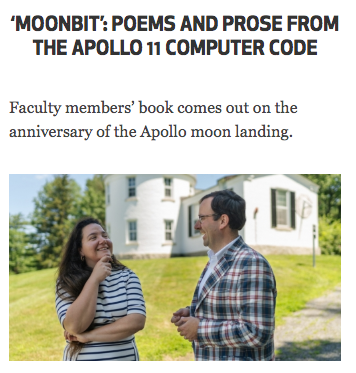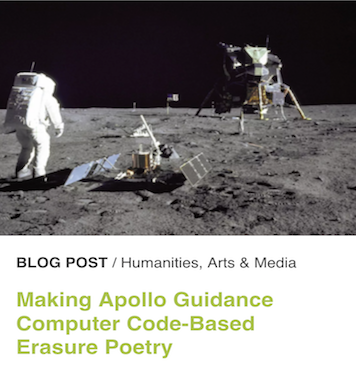"This book is both an invitation and a provocation: for those many of us outside of the world of coding, to step into a peculiar language (specifically, the language that 'wrote us' to the moon with Apollo 11); and for all of us, to wonder what it means that our lives are shaped by codes. Moonbit offers productive, profoundly serious bewilderment; and it also generates whimsical beguilement. All poets and writers should add this 'Cloud of Knowing' to their stack of dream books."
— April Bernard, author of Brawl & Jag, Romanticism, and Swan Electric
"Moonbit provides a remarkable creative and critical engagement with
historically significant code, continuing the latest discussions of the
cultural and historical complexities of programs, taking into account that they
are written for both computer and human interpretation. Its poems invite us to
imagine, and look into, the starfield of source from which they twinkle."
— Nick Montfort, author of The Future and The Truelist
"This is a fascinating book that exists in that magical space where human and machine collide. Come for the poetry, stay for the code."
— Chelsea Hodson, author of Tonight I’m Someone Else
"When the Apollo missions were turned up to eleven, the whole earth would
hear that this was a cultural, a poetic event - timeless, something that would
live in our language forever. The mission was also built on the formal language
of a maturing code architecture, laced with paragrams that recite and sing some
little bit of the moon's poetry, how the moon possesses us and how we wrote a
poem to touch the longed-for lunar surface in literal spacetime. Moonbit is a
book with selections of these captivating paragrams, along with careful,
studied expositions of how they got into the codework."
— John Cayley, programmatologist and Professor of Literary Arts, Brown University
"Moonbit goes deep into the heart of textual mystery to illuminate what
was once lost, forgotten, obscure. Through their linguistical and
anthropological uncovering of the Apollo Code, Rena J Mosteirin and James E
Dobson restore our humanity by reviving this potentially lost world of a
truly miraculous syntactical feat. Moonbit is a fascinating plunge into
the poetics of thought and control and execution; language can indeed land
us in other worlds. In this case, Moonbit is a new world that makes
manifest the poetics of revival and syntax and debris. This poetic
exploration is an exercise in how we imagine and partake in creation and
possibility, showcasing how very delicate our worlds and our words can be.
Memory, this book reminds us, is a thing that can be saved. Dobson and
Mosteirin have saved it for us, revealing how we humans are creatures of
terror and hope no matter the medium. Code is poetry and poetry is code and
both contain what and who we are as people. I am so grateful for
witnessing, in this text, how miraculous is the fall out and debris."
— Jenny Boully, author of Betwixt-and-Between: Essays on the Writing Life, The Book of Beginnings and Endings, and The Body.



